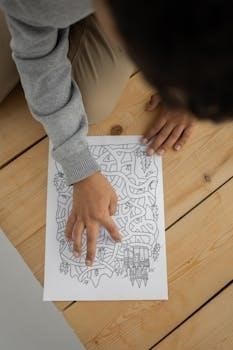Dementia worksheets provide cognitive stimulation, aiding memory, focus, and creativity. These activities enhance quality of life for those with dementia. They also make caregiving more enjoyable by offering engaging pastimes and meaningful interaction.
The Importance of Cognitive Stimulation
Cognitive stimulation is crucial for individuals with dementia, as it helps maintain brain function and slow cognitive decline. Engaging in activities like worksheets can promote focus and improve memory skills. Regular cognitive exercises can enhance overall well-being and provide a sense of accomplishment. These activities help create meaningful moments, reducing feelings of isolation and frustration. By keeping the mind active, worksheets can improve mood, reduce agitation, and enhance the quality of life for those affected by dementia. Furthermore, cognitive stimulation fosters engagement, reduces boredom, and encourages social interaction, thereby making caregiving more effective and enjoyable. It also provides a sense of purpose and connection.
Benefits of Printable Dementia Worksheets
Printable dementia worksheets offer easy access to cognitive activities, improving memory and focus. They are a cost-effective tool for caregivers, providing convenient, engaging, and stimulating pastimes for loved ones.
Why Printable Activities Are Ideal
Printable activities are ideal for dementia patients due to their accessibility and convenience. They offer immediate engagement without the need for specialized equipment or complex setups. These worksheets are easily downloadable and can be printed at home or care facilities. This allows for repeated use, and are suitable for various skill levels, promoting inclusivity. The simplicity of printable formats ensures that individuals with cognitive challenges can participate without frustration. Furthermore, printable activities can be tailored to individual preferences and cognitive abilities, providing personalized engagement. The visual and tactile nature of paper-based activities can also be more engaging than digital alternatives, which makes them an ideal solution for dementia care. They also help in maintaining mental stimulation.
Types of Printable Dementia Activities
Printable activities for dementia include memory-focused exercises, puzzles, word games, creative tasks, and coloring pages. These offer diverse options for cognitive engagement, providing stimulation and enjoyment.
Memory-Focused Worksheets
Memory-focused worksheets are designed to stimulate cognitive function and recall abilities in individuals with dementia. These activities include matching games, where users pair identical images or words, and simple recall exercises, where they are asked to remember specific details from a provided prompt. Picture recognition is another popular approach, where users identify familiar objects or faces. Sequencing tasks, involving ordering events or items correctly, can also be effective. These exercises help maintain or improve memory skills by encouraging active mental participation. They are a gentle way to prompt memory retrieval in a structured manner. These worksheets can be adjusted to suit different cognitive levels and preferences, making them versatile and valuable tools for caregivers. They can also involve identifying people, places or things from the past.
Puzzles and Word Games
Puzzles and word games offer excellent cognitive stimulation for individuals with dementia, helping maintain mental acuity. These activities include simple jigsaw puzzles with large pieces, making them easier to handle and complete. Word searches, adapted with large print and common words, are also beneficial. Crossword puzzles, designed for easy comprehension, provide a fun challenge. Matching games involving words or pictures promote memory recall. These activities encourage problem-solving and critical thinking. They also offer a sense of accomplishment upon completion. These puzzles and word games are designed to be engaging and accessible, adapting to different cognitive abilities. They provide mental exercise, and can help improve focus and concentration skills in a lighthearted manner.
Creative and Coloring Activities
Creative activities, like coloring pages with simple designs and large areas, can be very therapeutic for individuals with dementia. These activities help to engage artistic expression and provide a calming effect. Using thick crayons or markers can make coloring easier for those with limited dexterity; Simple drawing prompts or fill-in-the-blank pictures can also encourage creativity. These activities stimulate visual perception and fine motor skills. The act of creating can reduce anxiety and provide a sense of accomplishment. Additionally, looking at and discussing completed artwork can be a way to connect with loved ones. Such activities foster a positive and relaxed atmosphere, promoting emotional well-being.

Where to Find Free Printable Worksheets
Numerous websites offer free printable dementia activities. These resources provide a wide range of puzzles, coloring pages, and memory exercises, making it easy for caregivers to find suitable options.
Online Resources for Caregivers
Caregivers can find a wealth of free printable dementia worksheets online. Many specialized websites offer downloadable PDFs, including puzzles, memory games, and creative activities, designed to stimulate cognitive function and engagement. These resources often include materials for various stages of dementia, ensuring activities are appropriately challenging. Websites like “Keeping Busy” and “Activities to Share” provide diverse options, from seasonal themes to simple matching games, all readily accessible. These platforms aim to ease the caregiving process by offering free, ready-to-use materials, making it easier to provide meaningful activities for individuals with memory loss. Additionally, online communities and forums also share caregiver-created activity ideas.

Using Worksheets Effectively
Engage individuals with dementia by choosing activities matching their abilities. Offer support, encouragement, and adapt activities as needed. Create a calm, comfortable environment to maximize the benefits.
Tips for Engaging Individuals with Dementia
When using worksheets with individuals with dementia, create a calm and supportive environment. Choose activities that match their current cognitive abilities, ensuring they feel successful rather than frustrated. Break tasks into smaller, manageable steps and provide clear, simple instructions. Offer gentle guidance and encouragement throughout the activity, celebrating their efforts and accomplishments. Be patient and flexible, adapting the activity as needed to maintain their engagement and interest. Consider their personal preferences and past experiences when selecting worksheets. Use large print and clear visuals to aid comprehension. Always focus on the process and enjoyment rather than the outcome. Most importantly, make it a positive and meaningful experience.

Medications and Dementia Activities
Medications can help manage some dementia symptoms, but activities like worksheets are crucial for cognitive engagement. Certain medications should be avoided or used cautiously to minimize adverse effects.
Medication Considerations
When managing dementia, it’s crucial to consider medication use carefully. Certain drugs, including narcotics like hydrocodone and oxycodone, muscle relaxants such as cyclobenzaprine, and NSAIDs like ibuprofen and naproxen, should be avoided if possible. If these medications are necessary, they should be used at the lowest effective dose for the shortest duration to minimize adverse effects. Medications can interact with cognitive abilities, potentially hindering the effectiveness of dementia activities. Therefore, a balanced approach that combines medication management with cognitive activities, such as worksheets, is essential. Consulting with healthcare professionals is vital to navigate medication choices and ensure optimal care for individuals with dementia, while maximizing benefits from therapeutic activities.

Additional Support Resources
Online social activities, such as “Singing for the Brain,” offer engagement for those with memory loss. These platforms provide interaction, fostering connections, and offer a sense of community and support for individuals.
Online Social Activities
For individuals facing memory loss and dementia, online social activities present a valuable resource for maintaining social connections and cognitive engagement. The Alzheimer’s Society, for instance, offers “Singing for the Brain” sessions online, which demonstrates a way to adapt traditional support activities to the digital space. These virtual gatherings provide opportunities for interaction, fostering a sense of community and belonging. Such initiatives help to combat social isolation, which is often a challenge for those affected by dementia. Furthermore, the structured engagement of these activities can have a positive impact on cognitive function and emotional well-being. By participating in online social activities, individuals can find not just entertainment but also meaningful interaction and support from others who understand similar challenges. These resources are particularly helpful for those who may find it difficult to participate in traditional group settings due to mobility or other issues. The digital space opens new avenues for inclusivity in dementia care.
